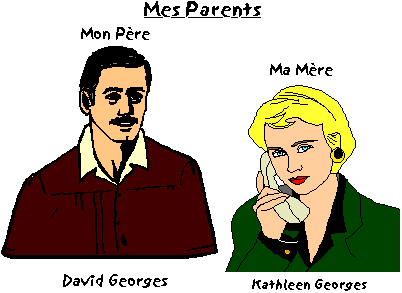French Level 2
Unité 3: Leçon 3c

|
Les Pronoms Possessifs
|
In the previous leçon you learned some new possessive pronouns. In this leçon we are going to review those pronouns and learn more. To start, let's review the use of the pronouns, "mon", "ma", and "mes".
I'm sure that you remember that these three words are the French equivalent of the English pronoun, "my"! Why do French people have three ways to say "my" and in English there is only one? (No, it is not to try and make you confused or crazy!!) It is because pronouns in French take a masculine or feminine form depending on the gender of the noun that follows them. We will use Luc's parents as the subjects of our example:
 Track 17 Track 17

|
As you have probably already guessed, when a noun is plural, the possessive pronoun must be plural too. Thus the English phrase 'my parents' becomes mes parents en français!
Now look at Luc's mother. Notice that the word "ma" is used with "mère". That's because "ma" is the feminine form for "my". Now Luc isn't female, he is male, so you are probably wondering why it is that he uses the word "ma" when talking about his mother. The answer is simple. The French form of "my" used must fit with the person or thing being discussed. It is not affected in any way by the speaker of the phrase. Thus Luc isn't confused about his own gender (masculine) when he chooses to use the word "ma" in the phrase, "Ma mère". Instead, he is certain about the gender of his mother (feminine) and he has expressed it correctly.
For his father, Luc uses the masculine form, "mon" because his father is male, not because Luc is male. Got it? Let's find out!
Look at the graph below. Repeat the words after me:
 Track 18 Track 18
|
The "Mon/Ma/Mes" Graph
|
The "My" Graph
|
|
mon
|
my (used with masculine nouns)
|
|
ma
|
my (used with feminine nouns)
|
|
mes
|
my (used with plural nouns)
|
Now let's look at some sentences using "mon", "ma", and "mes":
 Track 19 Track 19
|
The "Mon/Ma/Mes" Graph II:
|
The "My" Graph II
|
|
Mon père est beau.
|
My father is handsome.
|
|
Ma mère est gentille.
|
My mother is kind.
|
|
Mes chats sont petits.
|
My cats are small.
|
Now let's look at the next group of pronouns: "ton", "ta", and "tes":
 Track 20 Track 20
|
The "Ton/Ta/Tes" Graph
|
The "Your" (fam.) Graph
|
|
ton
|
your (used with masculine nouns)
|
|
ta
|
your (used with feminine nouns)
|
|
tes
|
your (used with plural nouns)
|
Now let's look at some sentences using "ton", "ta", and "tes":
 Track 21 Track 21
|
The "Ton/Ta/Tes" Graph II:
|
The "Your" (fam.) Graph II
|
|
Ton père est beau.
|
Your father is handsome.
|
|
Ta mère est gentille.
|
Your mother is kind.
|
|
Tes chats sont petits.
|
Your cats are small.
|
The next graph depicts words that mean "his" and "her(s)" in French. Repeat the words after me:
 Track 22 Track 22
|
The "Son/Sa/Ses" Graph
|
The "His/Her" Graph
|
|
son
|
his/her (used with masculine nouns)
|
|
sa
|
his/her (used with feminine nouns)
|
|
ses
|
his/her (used with plural nouns)
|
The French words, "son", "sa", and "ses" often cause English speakers stress, however they really should not. These words are used exactly the same way as "mon", "ma", and "mes" and "ton", "ta", and "tes". Masculine nouns ALWAYS follow the pronoun "son". Feminine nouns ALWAYS follow the pronoun "sa" and plural nouns ALWAYS follow the pronoun "ses". Whether the owner/speaker is male or female makes no difference. Here's an example. Suppose I want to tell you, en français, that Luc's shirt is blue. Since the word for shirt (chemise) is feminine. How would I say the sentence? I would say, "Sa chemise est bleue" (trans: His shirt is blue). What if I wanted to say that Victoire's shirt is blue? I would say, "Sa chemise est bleue". The two sentences are EXACTLY the same because the French word, "chemise" is feminine, therefore we must use the feminine pronoun for "his" and "her" which is "sa". The same thing would happen if we were talking about a "masculine" item that both Luc and Victoire owned. If they both owned green hats we would say, "Son chapeau est vert" for Luc and "Son chapeau est vert" for Victoire because the French word, "chapeau" is masculine.
One more thing. Let's suppose that Luc or Victoire has brown shoes. The sentences "His shoes are brown." and "Her shoes are brown" are the same. I would say, "Ses chaussures sont brunes".
Now let's look at some more sentences using "son", "sa", and "ses":
 Track 23 Track 23
|
The "Son/Sa/Ses" Graph II:
|
The "His/Her" Graph II
|
|
Son père est beau.
|
His father is handsome
OR
Her father is handsome.
|
|
Sa mère est gentille.
|
His mother is kind
OR
Her mother is kind.
|
|
Ses chats sont petits.
|
His cats are small
OR
Her cats are small.
|
We are half-way finished with the "prounoun section" of this Unité. Run and get something to eat and I'll get ready to give you the second group of pronouns in the next leçon!

|